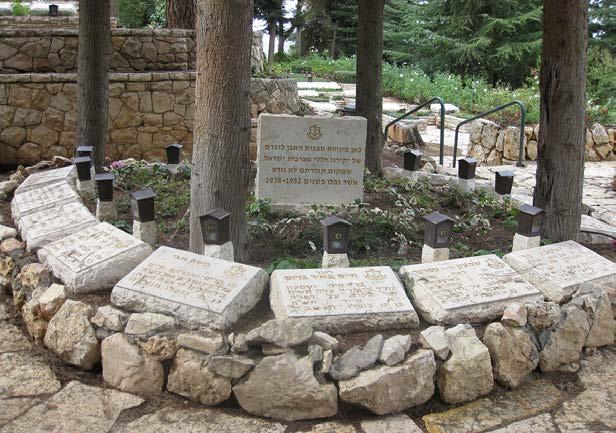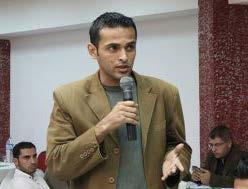
11 minute read
NEWS
ATTENTION Yeshiva & Seminary Students!
PLAN. TEST.
Advertisement
Earn your Bachelor’s Degree from a regionally accredited college in less than a year, through our individualized credit by exam program.
transfer already earned credits AT NO COST
reach your goals with one on one GUIDANCE & SUPPORT
study at your OWN PACE
take exams AT YOUR CONVENIENCE
“ “CTC is an amazing program! The flexibility that Lisa Meister offers allowed me to work full time while getting my bachelor’s degree within one year. I am now pursuing a master’s degree in Special Education. Tova L.
CALL NOW FOR A FREE CONSULTATION!
LISA MEISTER, EDUCATIONAL CONSULTANT, B.S. ED 410.258.1158 | LISA@BALTIMORECTC.COM
848.223.8724
West Bank is “Occupied” Again
The Biden administration is now calling the West Bank, Gaza Strip, Golan Heights, and East Jerusalem “occupied territory,” reversing changes made under President Donald Trump.
While the Trump administration broke longstanding tradition and deleted the phrase when referring to the aforementioned areas, the State Department’s report on international human rights violations defined the Gaza Strip, East Jerusalem and the Golan Heights again as “occupied territories.”
Even so, the State Department did not return to calling its chapter in the 2020 Country Reports on Human Rights Practices “Israel and the Occupied Territories,” keeping a change implemented by former U.S. Ambassador David Friedman. The envoy had waged a multi-year battle to change the name of the chapter from “Israel, Golan Heights, the West Bank and Gaza” to just “Israel.”
In a phone call with diplomatic correspondents, State Department spokesman Ned Price stressed that the Biden administration reverted to the traditional language to define “the current status of the West Bank.”
Dropping the term “occupied” from the annual State Department report was just one of many moves the Trump administration made that reversed historical anti-settlement positions traditionally held by the U.S. Throughout his four years in the White House, Trump and his advisers repeatedly reiterated their opposition to longstanding U.S. policy that viewed the areas Israel captured during the 1967 Six Day War as occupied territory.
Apart from recognizing Israel’s annexation of the Golan Heights and moving the U.S. Embassy to Jerusalem, former Secretary of State Mike Pompeo also declared that West Bank settlements do not violate international law and lifted a ban on using U.S. taxpayer money for Israeli scientific research conducted in Jewish villages in Judea and Samaria.
Info on IDF MIAs

Yamina party chairman Naftali Bennett passed a letter to Prime Minister Benjamin Netanyahu that contained detailed information regarding the burial place of troops missing in action for almost four decades.
The letter in question was printed on stationary belonging to the Palestinian National Organization (PLO), a terror group that controlled large swaths of Lebanon in the 1980s. Bennett transferred the document last July after his source told him that the handwriting belonged to former PA President Yasser Arafat.
The identity of the person who originally gave Bennett the letter was not disclosed and was described simply as “an entity of foreign origin.” According to reports, the document contained a handwritten map of a graveyard in Damascus, Syria, used by the PLO to bury its dead during the 1980s.
The map specifies the location of three unmarked graves along with instructions how to locate them should the need arise. While it is not known who is buried in the graves, it is suspected that the map refers to the final resting place of missing IDF soldiers.
Israel’s National Security Council (NSC) confirmed that it had received

MARCH 2021
I DIDN’T KNOW IT WORKS SO QUICKLY
He was a ger tzedek who had joined the Jewish community not long before. He was lucky enough to come in contact with a family who wholeheartedly cared for him and accommodated his needs with outstretched arms. ey followed the dictum, “V’ahavtem es ha’ger,” to the T.
In addition to providing for his physical needs, the family also tried to help him find a suitable place to learn. ey wanted him to be in a yeshivah setting that was appropriate for his level and would cultivate his growth warmly. It was hard to find.
The family was all-consumed by the search, phoning
whomever they could. ey spoke with directors of yeshivos and askanim, with no success. e ger’s language barrier made the selection much harder.
e woman, an outstanding baalas chesed, did so much for the wellbeing of this family friend. At a certain point she realized, however, that they had forgotten the most important part – they had forgotten tefillah!
She accepted upon herself to say more Tehillim while at the same time, giving in the name of the ger tzedek to the minyan of talmidei chachamim who recite the entire sefer Tehillim daily, as a group.
Two weeks later, a phone call to Tehillim Kollel from the woman revealed the happy ending of the story.
“I didn’t know that it works so quickly and so perfectly!” she exclaimed in amazement, her enthusiasm spilling over the wires.
“But a few days after Tehillim Kollel began davening in the early morning hours, we baruch Hashem found a most fitting place for the ger to learn. He is thriving and simply enjoying every minute! We couldn’t have imagined a better solution.”
WEEKLY COLUMN OF RECENT EPISODES BY TEHILLIM KOLLEL
Sign up for our annual mermbership: 718.705.7174
Info@TehillimKollel.org the document from Bennett but said that it had not contained any information that was previously unknown to the country’s various intelligence agencies. The NSC added that the letter was at least 20 years old and appeared authentic.
Yehuda Katz and Zvi Feldman have been missing in action ever since the Battle of Sultan Yakoub in 1982 during the outset of the First Lebanon War. Sent to secure the Damascus-Beirut Highway, an IDF brigade was cut off and encircled by Syrian and Lebanese troops.
Following heavy fighting that lasted an entire day, 30 IDF troops were killed and five missing. One of the soldiers was later found dead while another was freed in a prisoner swap in 1984, leaving Katz, Feldman, and Zachary Baumel as the remaining MIAs.
For the following three decades, Israel dedicated significant resources to uncover the whereabouts of the three, including launching a Mossad operation that resulted in the death of an undercover agent. In 2019, Russia transferred the remains of Zachary Baumel as part of a prisoner swap, leaving only Katz and Feldman unaccounted for.
Torture for Gazan with Ties to Israel

A Gazan peace activist was tortured and made to divorce his wife as punishment for meeting with a group of like-minded Israelis.
Rami Aman, a Gaza-based activist, had participated in a Zoom meeting last April with Israeli coexistence groups. During the two-hour call, Aman and members of his Gaza Youth Committee NGO spoke about different ways they could collaborate to end the Israeli-Palestinian conflict.
But soon after, clips of the meeting leaked on social media. Aman was soon barraged by hundreds of messages from angry Gazans calling him a “traitor” and threatening to harm him and his family.
The public anger Aman faced was nothing compared to what he suffered at the hands of the ruling Hamas terror group. A week after the meeting, Aman and his fellow activists were ordered to report to the local Internal Security branch for investigation.
Upon arriving, Aman was arrested by Hamas gunmen and imprisoned in a crude torture device known as “The Bus.” For the next three weeks, Aman underwent brutal torture, was forbidden from sleeping, and was forced to sit in a tiny kindergarten-sized chair from 6 a.m. until 1 a.m.
During his interrogation, his captors called him only by his prison number and accused him of “collaborating” with Israel against the Palestinian people.
“They did not present any evidence against me,” Aman recalled in an interview with the Times of Israel.
After 18 hours of torture, Aman’s ordeal took a bizarre turn. Escorting his wife into the interrogation room, Hamas officials ordered him to hand her a divorce. Claiming that “she doesn’t want you,” the lead investigator insisted that Aman sign the divorce papers.
According to Aman, his arrest was a ploy by his wife’s father to disassociate himself and his family from his peace-activist son-in-law. A senior Hamas commander, his father-in-law feared that Aman’s actions would reflect badly on him and would damage his career.
“I realized I was sent there to do time until I break up my relationship,” Aman said.
Finally, he signed the divorce papers and was released a week later. By that point, his ex-wife was spirited to Egypt by a Hamas delegation, making any attempt to get back together impossible.
Upon being contacted by the Associated Press, the woman confirmed that she had been forced to divorce Aman and did not want to end her marriage.
According to human rights activists, the episode illustrates the lengths to which Hamas will go to prevent locals from challenging the party line.


THE MISHNAH BERURAH
BottomLineMG.com
at your fingertips
Prefaced by HAGAON HARAV YITZCHOK SOROTZKIN shlit”a, Rosh Yeshiva of Telshe and Lakewood Mesivta, the sefer contains a thorough examination of all the halachos of Sefiras Haomer and the Three Weeks, based on the rulings of the Mishnah Berurah and is part of the popular Kitzur Halachos series.
Authored by RAV ZEV HOFSTEDTER, Rosh Yeshiva, Yeshivas Acheinu L’Tzeirim, Kitzur Halachos clarifies hundreds of common and practical halachos in a clear and concise format.
SOME OF THE TOPICS INCLUDE:
> Detailed halachos of the mitzvah of counting the Omer and cases of safek. > Minhagim of aveilus during the Sefirah period. > Halachos of Chadash and Yashan. > The Yom Tov of Shavuos.
OTHER SEFORIM IN TH E SERIES
AVAILABLE AT YOUR LOCAL SEFORIM STORE OR DIRECT FROM THE DISTRIBUTOR, ISRAEL BOOKSHOP AT 888-536-7427 / ISRAELBOOKSHOPPUBLICATIONS.COM
“The deplorable treatment of Rami Aman by Hamas authorities reflects their systematic practice of punishing those whose speech threatens their orthodoxy,” noted Omar Shakir from Human Rights Watch.
Bibi Tapped to Form Govt
On Monday, President Reuven Rivlin gave Prime Minister Benjamin Netanyahu the go-ahead to attempt to form a government but noted that he was doing so reluctantly, both because no party leader appeared to have enough support to succeed at cobbling together a ruling coalition and because he had “moral and ethical” reservations given that Netanyahu is on trial for corruption.
“This is not an easy decision on a moral and ethical basis, in my mind,” Rivlin said. “And I fear for my country. But I am doing what is required of me as president of the State of Israel, according to the law and to the ruling of the court, and realizing the will of the sovereign – the Israeli people.”
Rivlin’s choice came a day after he held consultations with all party leaders in the Knesset to hear whom they will back to form a government. No party leader had the support of a majority of the Knesset’s 120 lawmakers.
“The results of the consultations, which were open to all [they were aired live], led me to believe that no candidate has a realistic chance of forming a government that will have the confidence of the Knesset,” he lamented. “In fact, if the law would allow me to do so, I would hand the decision back to the representatives of the people, to the Knesset.”
However, noting that he could not do so by law, Rivlin said the principal consideration was “which candidate has the best chance of forming a government that has the confidence of the new Knesset.”
Underlining his reservations over his decision, Rivlin did not invite Netanyahu to a ceremony formally tasking him with forming a government, as is the norm when a prospective prime minister is named.
Netanyahu will now have 28 days to try to muster a coalition that can win majority support in the Knesset, but, given that he only has the backing of 52 out of 120 lawmakers, it will be a challenge.
Netanyahu was endorsed by his Likud party, with 30 seats; Shas, with 9; United Torah Judaism, 7; and Religious Zionism, 6.
Lapid was recommended as prime minister by 45 lawmakers (Yesh Atid 17, Blue and White 8, Yisrael Beytenu 7, Labor 7, Meretz 6), and Naftali Bennett by the seven members of his own Yamina party.
The three parties that made no recommendations account for the final 16 Knesset seats (New Hope 6, Joint List 6, and Ra’am 4).
If Netanyahu does not succeed in forming a government, the president can either task a second person with the attempt (for another period of 28 days and a possible additional 14), or send the mandate back to the Knesset, giving the legislature 21 days to agree on a candidate supported by 61 MKs.
If the president appoints a second person and that person also fails to assemble a coalition, the mandate automatically returns to the Knesset for the 21-day period. During that time, any MK is eligible to attempt forming a government.
At the end of the 21-day period, if no candidate has been agreed upon by 61 MKs, the new Knesset automatically disbands and the country heads to yet another election, the fifth in under three years.











